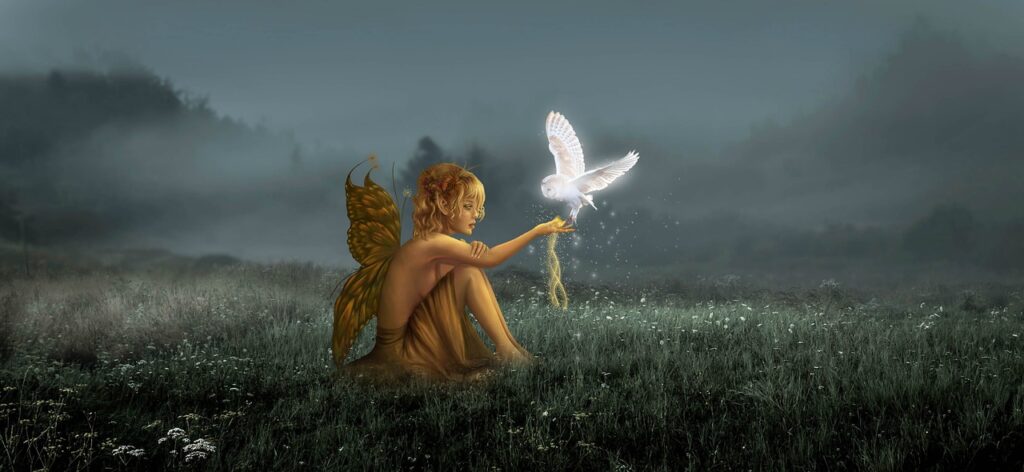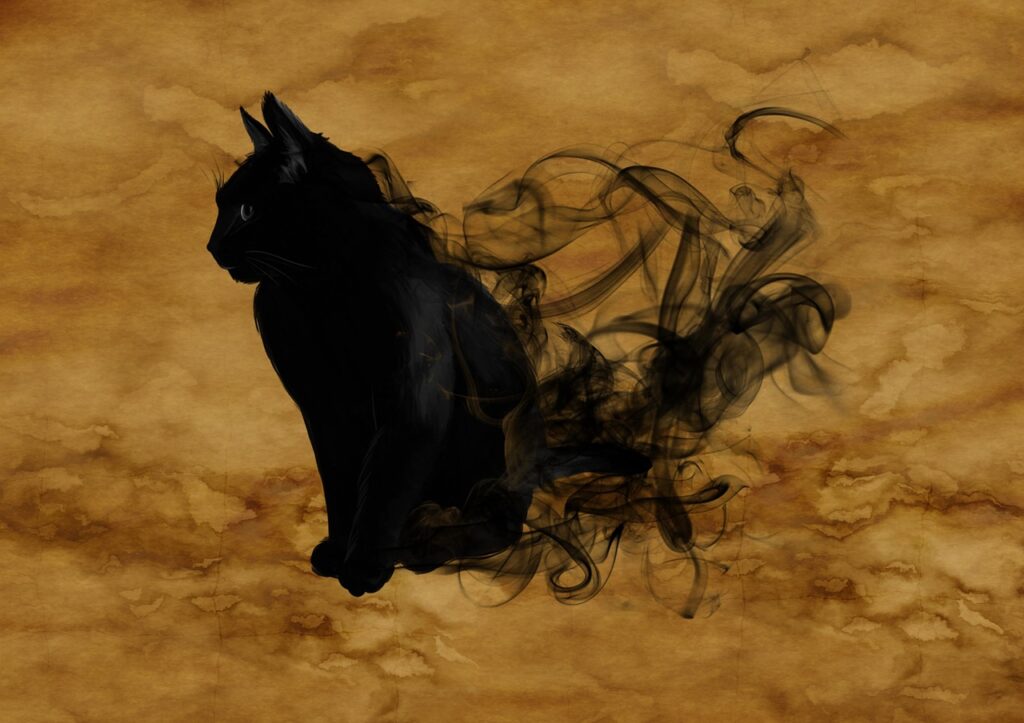A magic familiar is a pet, creature, or beast that accompanies and assists a spell caster in your story or roleplaying game. Wizards, witches, and all sorts of magic users can raise familiars to boost their powers… or simply to have an entertaining sidekick. Let’s be honest, every story is better with a weird little sidekick hanging around.
This week at cre8opedia, we took on the task of brainstorming a flurry of ideas about magical familiars. We’re sure you’ll find something fun here to use whether you’re composing a fantasy story or planning an NPC for your next gaming session.
Familiars come in all shapes and sizes with a wide range of powers and abilities to ramp up your narrative fun. Enjoy these menus!
Writing Prompts for Magic Familiars
You didn’t even know you were magic… until your pet started talking to you. This little familiar, it turns out, can teach you how to cast spells. What do they teach you and how do you use your new powers?
Imagine if your magic user’s familiar became possessed or cursed. What would be the first subtle signs? And what kind of madness might ensue over time? A quest to reverse its effects is a whole ‘nother story!
Your magic user is in the catacombs beneath the city with their familiar tagging along. When they ask their familiar a question, there’s no response. Uh oh. Where’d they go?
What happens when you realize that your familiar has a special power of their own, such as levitation, breathing fire or ice, or invisibility? Let them take center stage for a bit!
A spellcaster with their last words tells you to go to their lab to protect something, but it is unclear what. When you arrive, you see their magic familiar with a key on a chain about its neck. What does it open and what will you find? How might the familiar help you?
All is well with your magic until one day you can’t quite get a spell right. You realize your magic familiar is sick. In order to heal them — as you can’t figure it out on your own — you need to get them to a wise master who lives far away. Can you get them there in time and how will your magic manage in the meantime?
Types of Magic Familiars
Familiars come in all shapes and sizes with a wide range of powers and abilities to ramp up your narrative fun. You can use any animal for a familiar, but we’ve listed here a few standards as well as some that jump out as kinda fun. Be creative and make a hybrid, half-and-half of some kind if you like! Remember to give your familiar a personality of their own.
- cat, feline, kitten, pussy cat, lion, tiger, puma, jaguar, cougar,
- dog, wolf, canine, poodle, mutt, puppy, great dog,
- eagle, hawk, raven, raptor, crow,
- bird, pigeon, dove, songbird, tweety bird, love bird, canary, lark, sparrow,
- snake, cobra, boa, viper, asp,
- reptile, lizard, newt, frog, snake,
- horse, donkey, pony, unicorn, fawn,
- dolphin, shark, crab, octopus,
- toad, frog, newt, lizard,
- butterfly, moth, swarm of flies (great for a necromancer),
- bat, rat, mouse, badger, ferret, hamster, gopher, squirrel,
- minotaur in a labyrinth, budgie in a golden cage, wolverine on a chain,
- animated stick, talking sword, intelligent marble, magic deck of cards
- Some magical creatures can make great familiar companions; for example: pixie, sprite, brownie, baby dragon, griffon, wyvern, pegasus, satyr, fire elemental,
- Similarly, you may have a familiar that is created or conjured: golem, demon, construct, angel, animated sword, enchanted doll, spirit-imbued marionette, sentient puppet, possessed ring or wand
- Gnomes like to tinker with gears and make little metal familiars for their magic; for example: wind-up bird, mechanical rat, segmented snake, steam-powered fox, air-bladdered butterfly,

Who Might Have a Magic Familiar?
We may think about the obvious wizard and witch and warlock when it comes to magic familiars, but we can get much more creative than that. In other words, anyone could have a companion that gives them some magical intuition or acts as a talisman for strength. I mean, think of the connections folks have with their pets. Even in the world of science fiction we see “familiar” bonds, such as that between Luke Skywalker and his droids in the Star Wars universe.
Below we have a collection of character types we brainstormed for which a magic familiar could be particularly fun:
- sorcerer, sorceress, or necromancer with an undead poodle
- travelling rodeo cowboy with a cool lizard
- shop owner with a very watchful owl
- librarian with a mouse in the shelves
- space station captain with an extra-special extraterrestrial
- street performer with a sly snake or mysterious monkey
- fortune teller with an ancient cat that has one crystal eye
- chef with a helpful octopus
- neighbourhood hoarder who’s hiding a dragon
- bard with an accompanying buck
- pauper with a stolen songbird
- Take a typical pair and boost it by injecting some magic ability: pirate and parrot, knight and horse, “man” and his best friend dog, “cat lady” and her many magical cats, high-society type with a chihuahua in a handbag, scientist and one particular lab rat,
How Can a Familiar Help My Character?
Familiars are fun because they can be an extension of your character. For example, they can be an extra set of hands, an alternative point of view, or a holder of knowledge. In other words, they add more scope to your characterization. Here are a few tips on how to use a familiar to great advantage as a magic user:
- Mana source – A familiar serves as a conduit for your magic. It channels power or represents your deity or has a connection with your mana source. In this way, it is not only treasured but honoured, pampered, and protected at all costs. Or maybe they are a deity themselves. Talk about a game changer!
- Spell storage – Let’s face it, magic users are all about spells. A familiar stores spells that the magic user can draw out as needed. This increases the spell caster’s capacity for magic. Having a few of those spells that are rarely required, though crucial at the right time, at hand make the familiar much more than a fancy pet.
- Scout ahead – One of the greatest assets of a familiar is its usefulness as a scout. It can be an extra set of ears or eyes (or nose in the case of a canine), which can save your skin in many situations. If your familiar is a bat or bird or butterfly, it can wing above and see things from a most advantageous point of view. The telepathic link between a magic user and a magic familiar is magical indeed.
- Extra set of hands – The familiar is handy for gathering spell components or holding your wand while you take a wizz. Some familiars can hold things or carry things or wear things, which can be very useful if, for example, you have way too many magic rings.
- They’re smarter than you are – The familiar is often extremely wise. In some cases, they have all the answers though they can be coy about sharing them. When all seems lost, turn to your familiar for answers.

How Can a Magic Familiar Help My Story?
We’ve looked at how the familiar can help out a character. Another angle to take is to ask how a familiar can help a writer or gamemaster to take a story a little further. By adding a familiar to a story that involves magic users, you allow for a new layer of epically fun chaos! Check out some of these ideas:
- Quests and adventure hooks – The familiar is a useful source for brand new adventures full of peril in your storytelling. For example, a magic user can be sent on a quest to find a familiar. Also, familiars can be unpredictable, getting lost, stolen, or injured. Furthermore, they are notorious for being dangerously curious.
- Just a good friend – For the narrative world where character is key, having a ready friend with which to banter, discuss, debate, or bicker is invaluable. Some wizards, in their rambling way, need to talk things through with their trusted familiar before coming to a decision. Similarly, a familiar will have a spark of intuition to solve confounding problems from time to time.
- Creating chaos – You can use a familiar to take a simple situation and fill it with untimely shenanigans. As mentioned above for example, a familiar’s curiosity can create trouble as they stick their nose where it doesn’t belong. Similarly, if a familiar gets into the wine, blurts out an untimely insult, or climbs up the wrong pant leg, it can lead to great narrative fun, to the chagrin of your magic user.
- Peripheral point of view – The unique perspective of your character’s familiar adds interesting texture to your storytelling. For example, if your character is in a state of rage, their familiar provides an opportunity to watch their steaming and gesticulations from the outside. This can provide a moment of comedy or commentary from the familiar.
- A clever twist – A familiar can be used as a device to provide a necessary twist to make a situation either better or worse, depending on the narrative need. A familiar can always reveal a secret, find a clue, or act as a channel of betrayal.
Final Notes and Thoughts on Magic Familiars
In your stories or roleplaying games, magic familiars can play a range of roles, from the mere sidekick who puts in a word or two for comic relief, to a well-rounded character in their own right that adds an intriguing dimension to your plot or theme. In the end, we hope this post has given you some inspiration to include a magic familiar in your storytelling.
Finally, check out some of these links to further information and inspiration:
- Wikipedia digs into some of the background mythology of magic familiars in this article.
- Take a look at our cre8opedia post on Magic Characters for more ideas on folks in your stories that may have a familiar.
- Here’s a fun post we created on Magic Side Effects so that when magic happens, you can add in some fun shenanigans.
- As a very useful post, here are some cre8opedia story starters around the idea of Finding Something Strange.